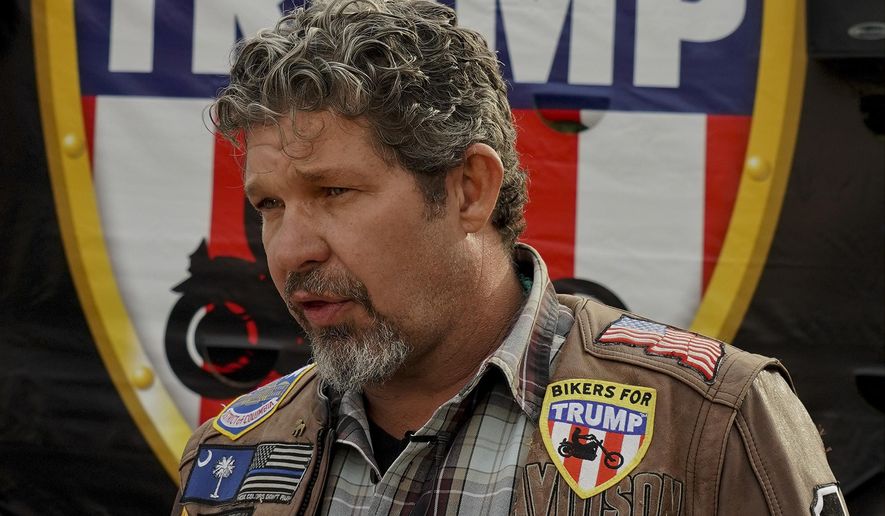The wild ride of Bikers for Trump is just getting started.
A year after President Trump’s historic upset victory, the grass-roots biker movement he inspired has become a bona fide political organization that is boosting Republican candidates across the country and making inroads in unexpected places, such as in Amish and Mennonite communities.
That’s right — Amish families are showing up in their horse-drawn buggies at Bikers for Trump rallies staged in barns in rural Pennsylvania and Ohio.
Chris Cox, the founder and leader of Bikers for Trump, said the Amish already had an affinity for the leather-and-chrome crowd.
“The biker is trusted because of the work that they do in raising money for veterans and Toys for Tots and fighting domestic violence and child abuse,” he said. “So we’ve really got a much bigger reach and platform than I ever imagined.”
Indeed, the group that early on acted as unofficial security at Trump rallies — the “wall of meat” separating protesters and supporters — now is an organizing tool that is in demand for House, Senate and governors races.
“I’m getting five calls a week from people who are running around the country that are trying to get us to come on and endorse them. The phone rings off the hook,” Mr. Cox said. “It’s bizarre that they see us as being so influential. It makes you step back a minute.”
The group coalesced during the presidential race as Mr. Trump’s message resonated with various biker communities, uniting blue-collar workers, veterans and evangelicals such as the Bikers for Christ organization. It was an easy marriage of people who shared enthusiasm for motorcycles and the outsider presidential candidate who was shaking up American politics.
The seeds of Bikers for Trump were planted during the government shutdown in 2013, when President Obama closed down open-air memorials in Washington.
Mr. Cox, a chain saw sculptor, showed up carrying a South Carolina flag and pushing a lawn mower to cut the grass around the Lincoln Memorial, saying he was doing it for veterans.
Dubbed the “Lawn Mower Man,” Mr. Cox became a TV news celebrity. He said the experience taught him how to harness the power of the news media for political activism.
He spent two years walking the halls of Congress in support of a bill that would keep open-air memorials accessible during government shutdowns.
“I went to so many congressional offices, and I saw how the establishment pandered to the herd and the herd held party lines,” he said. “Then when Donald Trump came along and was outside the establishment, I just thought it was the perfect opportunity to change the direction of the country.”
After seeing his first Trump rally while at an art show near Ocean City, Maryland, Mr. Cox began testing the level of support among bikers. Bikers for Trump quickly took shape.
Mr. Cox expected Bikers for Trump would go into hibernation after Mr. Trump’s inauguration in January. He planned to return to his work as an artist carving logs into cigar store Indians, dolphins, sea turtles, bears and other animals.
The Bikers for Trump movement had other plans.
“When Donald Trump won, all these protesters started coming out even more than they did during the campaign. So we were needed,” said Mr. Cox. “I got about a four- or five-day break before I realized I wasn’t going to be able to go anywhere. I was in too deep, and we had to keep it going. He needed us.”
Since then, Bikers for Trump has been involved in most of the major political races this year.
“It was like a political science experiment to see if the bikers could have an influence on state politics the way they did in the presidential race,” Mr. Cox said.
The bikers helped turn out the vote when Republican Karen Handel beat Democrat Jon Ossoff in the June 20 special election for Georgia’s 6th Congressional District, filling the seat vacated when Tom Price became secretary of Health and Human Services.
They showed up to help Republican Ed Gillespie in the Virginia governor’s race but were politely refused by the candidate, who ultimately lost to Democrat Ralph Northam.
They rallied for Mr. Trump’s pick of Sen. Luther Strange in the Republican primary for the Alabama special election, and then for Republican nominee Roy Moore after the president endorsed him.
Now the bikers are supporting Rep. James B. Renacci, a Republican running for governor in Ohio. It was a natural alliance. Mr. Renacci has an ownership stake in three Harley-Davidson dealerships in the Buckeye Sate.
They also are working with Kelly Ward, a Republican candidate for U.S. Senate in Arizona.
Completing the political transformation, the group recently launched a political action committee dubbed Bikers for the President PAC. Nearly $10,000 in contributions rolled in on the first day.
Bikers for Trump has about 80,000 active members and 400,000 followers on social media. It is run by roughly 50 full-time volunteers and 100 part-time volunteers.
Michael Glassner, executive director of the Trump re-election campaign, said he expects to see a lot more of Bikers for Trump.
“Members are bound by their love for the open road, freedom, and the promise of a greater America under President Trump’s leadership,” he said. “They are one of the more diverse coalitions because they come from all walks of life, including war veterans, Christians, manufacturing workers and corporate CEOs.
“They will make a big difference once again in 2020 because of their true grit and their unflinching devotion to our movement to make America great again.”
• S.A. Miller can be reached at smiller@washingtontimes.com.




Please read our comment policy before commenting.